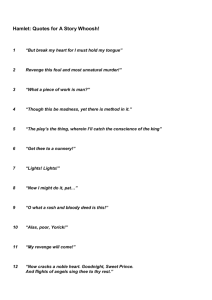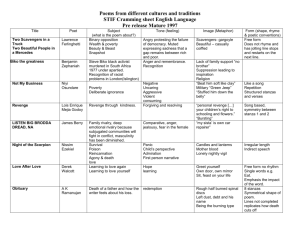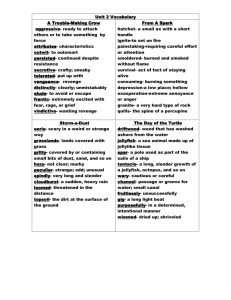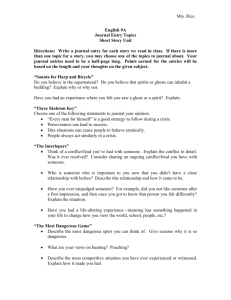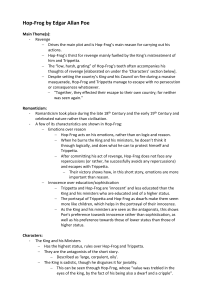Revenge and the people who seek it
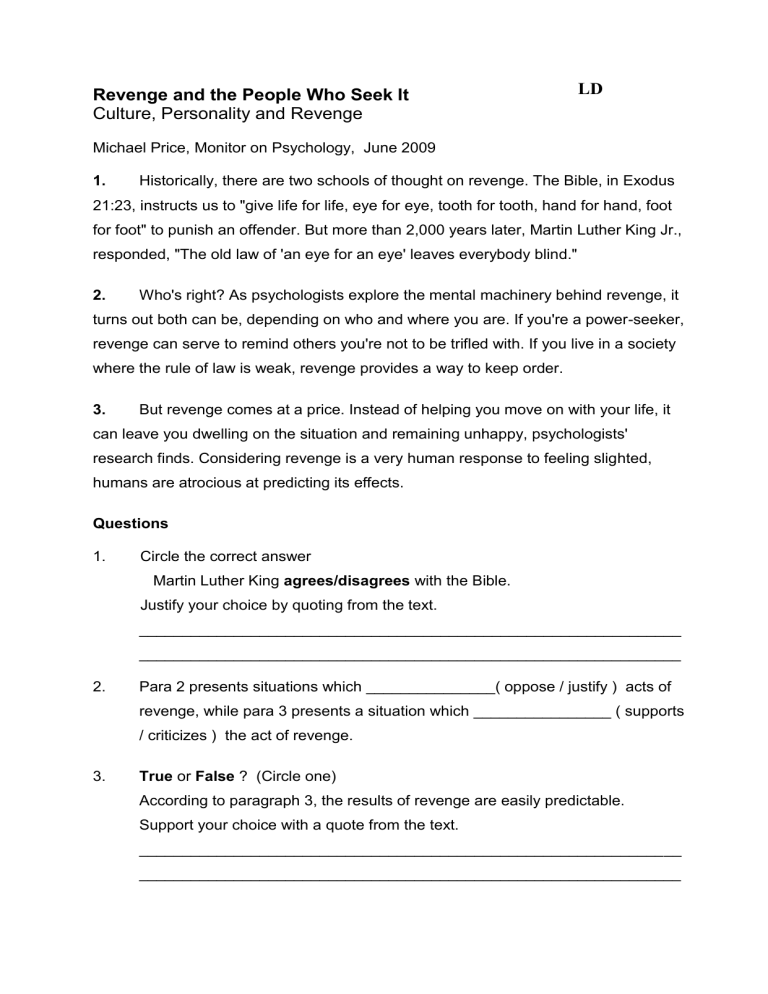
Revenge and the People Who Seek It
Culture, Personality and Revenge
LD
Michael Price, Monitor on Psychology, June 2009
1.
Historically, there are two schools of thought on revenge. The Bible, in Exodus
21:23, instructs us to "give life for life, eye for eye, tooth for tooth, hand for hand, foot for foot" to punish an offender. But more than 2,000 years later, Martin Luther King Jr., responded, "The old law of 'an eye for an eye' leaves everybody blind."
2.
Who's right? As psychologists explore the mental machinery behind revenge, it turns out both can be, depending on who and where you are. If you're a power-seeker, revenge can serve to remind others you're not to be trifled with. If you live in a society where the rule of law is weak, revenge provides a way to keep order.
3.
But revenge comes at a price. Instead of helping you move on with your life, it can leave you dwelling on the situation and remaining unhappy, psychologists' research finds. Considering revenge is a very human response to feeling slighted, humans are atrocious at predicting its effects.
Questions
1. Circle the correct answer
Martin Luther King agrees/disagrees with the Bible.
Justify your choice by quoting from the text.
_______________________________________________________________
_______________________________________________________________
2. Para 2 presents situations which _______________( oppose / justify ) acts of revenge, while para 3 presents a situation which ________________ ( supports
/ criticizes ) the act of revenge.
3. True or False ? (Circle one)
According to paragraph 3, the results of revenge are easily predictable.
Support your choice with a quote from the text.
_______________________________________________________________
_______________________________________________________________
The avengers
4 . Social psychologist Ian McKee, PhD, of Adelaide University in Australia, studies what makes a person seek revenge rather than just letting an issue go. In May 2008, he published a paper in Social Justice Research (Vol. 138, No. 2) linking vengeful tendencies primarily with two social attitudes: right-wing authoritarianism and social dominance, and the motivational values that underlie those attitudes. "People who are more vengeful tend to be those who are motivated by power, by authority and by the desire for status," he says. "They don't want to lose face."
5.
In his study, McKee surveyed 150 university students who answered questions about their attitudes toward revenge, authority and tradition, and group inequality. He found that the students whose answers showed a deference to authority and respect for traditions and social dominance, had the most favorable opinions about revenge and retribution. Those personalities, McKee says, "tend to be less forgiving, less benevolent and less focused on universal-connectedness-type values."
Questions
4. What kinds of thinking is revenge connected with, according to Ian McKee's
2008 paper? a. b.
_________________________________________________________
_________________________________________________________
5. Circle the correct answer and fill in each blank with ONE or TWO words.
McKee's findings show that those students who agreed with / disagreed with taking revenge, also had respect for ________________________ ,
________________________ and _______________________ .
6.
There's also a cultural dimension to people's predilection for revenge, says revenge researcher Michele Gelfand, PhD, a professor of psychology at the University of Maryland, College Park. She and her collaborators Garriy Shteynberg and Kibum
Kim have found that different events trigger the revenge process in different cultures;
American students feel more offended when their rights are violated, whereas Korean
students feel more offended when their sense of duty and obligation is threatened, they show in a paper in the January Journal of Cross-Cultural Psychology . That distinction could fuel intercultural conflicts when one side seeks vengeance for a slight the other didn't even know it committed. For example, an American might be more likely to seek revenge on someone who impinges on his or her right to voice an opinion, whereas public criticism that embarrasses a Korean in front of his or her friends might be more likely to trigger revenge feelings.
7.
Gelfand has also found that collectivists are more likely than individualists to avenge another's shame. To collectivists, shame to someone with a shared identity is considered an injury to one's self, she explains. As a result, she says, "revenge is more contagious in collectivist cultures." "You just don't realize those situations are construed [by the other culture] as very important and self-defining," Gelfand says.
The emotions that fuel revenge may differ across cultures as well, says Gelfand. In her studies, she has found that anger often drives the vengeful feelings of people in individualistic cultures, while shame powers revenge in collectivist ones.
Questions
6. What were the findings of Gelfand's research? Tick (V) THREE.
____ individualists readily avenge another person's shame
____ vengeful feelings of individualists are often driven by anger
____ revenge of collectivists is driven by shame caused to someone from their group
____ individualistic cultures are more prone to revenge than collectivist ones.
____ Americans are likely to be offended when deprived of the ability to express their opinion
____ Koreans can be more easily offended than Americans and therefore are more prone to revenge
The revenge paradox
8.
Ask someone why they seek revenge, though, and they're likely to tell you their goal is catharsis, says Kevin Carlsmith, PhD, a social psychologist at Colgate
University in Hamilton, N.Y. But exactly the opposite happens, according to a study he published in the May 2008 Journal of Personality and Social Psychology .
9.
In a series of experiments, he and his colleagues Daniel Gilbert, PhD, at
Harvard, and Timothy Wilson, PhD, at the University of Virginia, set up a group investment game with students where if everyone cooperated, everyone would benefit equally. However, if someone refused to invest his or her money, that person would disproportionately benefit at the group's expense. Carlsmith planted a secret experimenter in each group and had them convince everyone to invest equally. But when it came time to put up the money, the plants defected. The free riders, as
Carlsmith calls them, earned an average of $5.59, while the other players earned around $2.51. Then Carlsmith offered some groups a way to get back at the free rider:
They could spend some of their own earnings to financially punish the group's defector. "Virtually everybody was angry over what happened to them," Carlsmith says, "and everyone given the opportunity [for revenge] took it."
10 . He then gave the students a survey to measure their feelings after the experiment. He also asked the groups who'd been allowed to punish the free rider to predict how they'd feel if they hadn't been allowed to, and he asked the non-punishing groups how they thought they'd feel if they had. In the feelings survey, the punishers reported feeling worse than the non-punishers, but predicted they would have felt even worse had they not been given the opportunity to punish. The non-punishers said they thought they would feel better if they'd had that opportunity for revenge
— even though the survey identified them as the happier group. In other words, both groups thought revenge would be sweet, but their own reported feelings agreed more with Martin Luther King Jr. than with Exodus.
11.
The results suggest that, despite conventional wisdom, people —at least those with Westernized notions of revenge —are bad at predicting their emotional states following revenge, Carlsmith says. The reason revenge may stoke anger's flames may lie in our ruminations, he says. When we don't get revenge, we're able to trivialize the event, he says. We tell ourselves that because we didn't act on our vengeful feelings, it wasn't a big deal, so it's easier to forget it and move on. But when we do get revenge, we can no longer trivialize the situation. Instead, we think about it. A lot.
"Rather than providing closure, it does the opposite: It keeps the wound open and fresh," he says.
Questions
7. There were 2 different groups in Carlsmith's experiment. What is the difference between them? One group ___________________________________ while the other group didn't. What is similar about the 2 groups? They both
______________________________________________________________
8. What did Carlsmith learn? The results of his experiment show that
_____________________________________________________
_________________________________________________(up to 10 words)
9. Circle the correct answer and fill the blanks with ONE word each.
According to Carlsmith's explanation of his findings, a person feels better when he gets / does not get revenge, because only when there is no revenge, then can we___________________ the event and ____________________ it.
Revenge or justice?
12 . If revenge doesn't make us feel any better, why do we seek it? Carlsmith describes one evolutionary hypothesis, suggested by German psychologists Ernst
Fehr, PhD, and Simon G¨echter, PhD. "Punishing others in this context—what they call 'altruistic punishment'
—is a way to keep societies working smoothly," Carlsmith says. "You're willing to sacrifice your well-being in order to punish someone who misbehaved." And to get people to punish altruistically, they have to be fooled into it.
Hence, evolution might have wired our minds to think that revenge will make us feel good.
13 . Another possibility might be that certain groups and societies
—such as those in largely lawless Somalia or in areas of the Middle East where tribal rule holds more sway than the national government
—are more prone to seek revenge because there's just no other way to obtain justice, says McKee. "By and large, these types of impulses have arisen and still exist where there's no recourse to law," he says. That can apply to cultures without a functional legal system, he says, or in groups that operate outside the law, like gangs and the Mafia. "They have to rely on their own
retaliatory methods," he says. Some of these cultures might not even experience the negative emotional backlash Carlsmith found in his study. In her experience, Gelfand says, cultures that place a high value on revenge offer more social support to avengers.
Questions
10. People are willing to punish others in an "altruistic" manner because a) someone has forced them to behave like a fool b) they don't believe that revenge will make them feel good c) it is worth making themselves feel bad in order to see the offender punished d) of social pressure
11. a.What might be the reason for higher tendency of seeking revenge in the
Middle East and Somalia?
_______________________________________________________________
_______________________________________________________________ b.Which two groups of people (besides tribes in the Middle East and Somalia) are prone to revenge, according to McKee? Give general answers, not specific examples. i. __________________________________________________ ii. __________________________________________________
14.
But by looking into what motivates revenge, and by increasing our knowledge about how revenge makes us feel, it might be possible to combine the best aspect of justice and revenge. For example, McKee studies ways that institutional punishment can merge with victim's wishes to participate in that punishment. Victim impact statements, where victims are allowed to describe their ordeal and offer input on an offender's sentencing, have become common in U.S., Australian and Finnish courts.
Doing this can partially satisfy a victim's vengeful feelings while also putting the responsibility for punishment on the state, protecting the victim from the rumination trap Carlsmith describes. "Then victims sort of get the best of both worlds," McKee says.
Questions
12. What allows a victim to "get the best of both worlds" (last sentence of par. 14)?
Complete the following sentence with ONE word in each space
The fact that his/her ________________ ________________ are satisfied whereas the ________________ for ________________ is put on the state.
13. What is the main purpose of this article? a. To discuss possible reasons and consequences of revenge. b. To show that collectivist cultures are more prone to revenge than individualistic ones c. To convince people not to take revenge when they want to. d. To help people deal with situations when they cannot take revenge.
Grammar Exercises
Identifying Adjective Clauses and the words they modify.
Circle the adjective clause(s) in each sentence. Draw an arrow to the word the clause modifies. Underline the MAIN verb in the sentence.
1. People who are more vengeful tend to be those who are motivated by power, by authority and by the desire for status. (para 4)
2. McKee surveyed 150 university students who answered questions about their attitudes toward revenge, authority and tradition, and group inequality. (para 5)
3. He found that the students whose answers showed a deference to authority and respect for traditions and social dominance, had the most favorable opinions about revenge and retribution. (para 5)
4. An American might be more likely to seek revenge on someone who impinges on his or her right to voice an opinion. (para 6)
5. Public criticism that embarrasses a Korean in front of his or her friends might be more likely to trigger revenge feelings. (para 6)
6. The emotions that fuel revenge may differ across cultures as well.
(para 7)
7. He also asked the groups who'd been allowed to punish the free rider to predict how they'd feel if they hadn't been allowed to. (para 10)
8. Cultures that place a high value on revenge offer more social support to avengers. (para 13)
9. Victim impact statements, where victims are allowed to describe their ordeal and offer input on an offender's sentencing, have become common in U.S., Australian and Finnish courts. (para 14)
